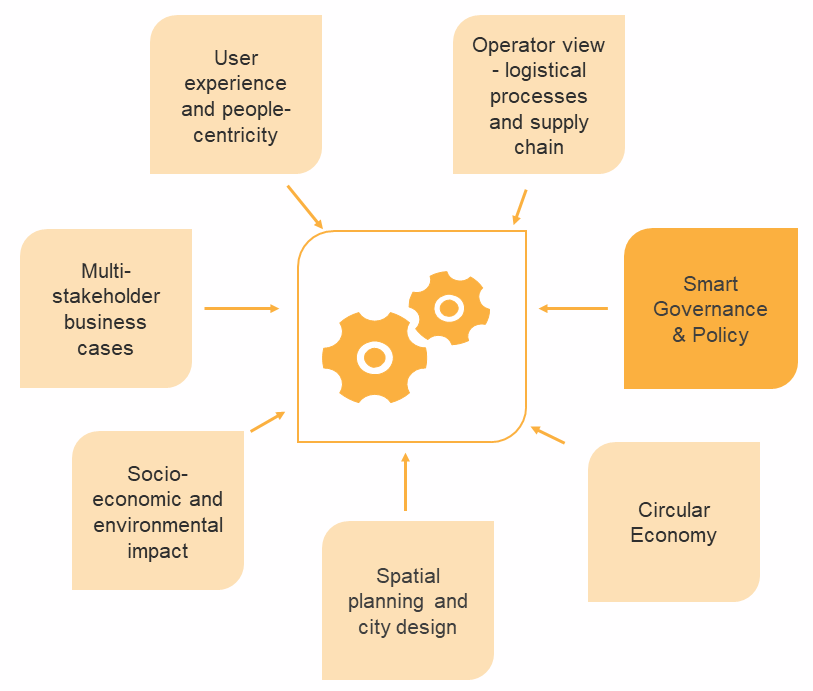Diving into 'Smart Governance & Policy' - POLIS Shares Insights in our 'Focus On' Series.
Today's Partner

Daniel Herrera
Project Manager
POLIS Network
Role within MoLo Hubs
Network Partner and Work Package Leader on Smart Policy and Legacy

Zsófia Jákói
Project Officer
POLIS Network
Role within MoLo Hubs
Network Partner and Work Package Leader on Smart Policy and Legacy
Why are smart governance & policy relevant aspects for MoLo Hubs?
Smart governance and policy are crucial for MoLo Hubs because they ensure that the innovative logistics services integrated into mobility hubs are not only efficient and user-centric, but also sustainable and scalable. Effective governance provides the framework for coordinating various stakeholders, managing resources, and ensuring compliance with environmental and urban regulations to meet societal goals.
Policy support is essential for creating a set of ready-to-use guidelines for these new services in the form of policy instruments, i.e., laws, decrees, plans, agreement frameworks with operators, subsidies, incentives, etc., allowing innovation, and ensuring that the benefits of reduced urban traffic and enhanced mobility hub functionality are realized across cities.

What are the key challenges when it comes to smart governance & policy?
Ensuring effective governance and providing clear policy guidelines are not easy tasks no matter the topic. Bringing together passenger mobility and logistics services into hubs represents a novel concept, which requires a continuous assessment of all the phases of the service to be implemented. Ultimately, the goal is to find the right elements to guarantee a long-lasting product, and the best way to do so is by creating an effective governance network and clear policy guidelines.
Here resides MoLo Hubs’ main smart governance and policy challenges:
- How do we create the right governance network for such a novel service?
- How do we provide clear ready-to-use guidelines capable of materializing a good service?
One answer to the challenge of governance and coordination across various stakeholders is to have the capacity to balance the interests of city planners, logistics companies, mobility providers, and citizens. This requires complex mechanisms to ensure all parties are aligned. From a policy perspective, existing regulatory hurdles can present significant obstacles. Adapting existing regulations to accommodate innovative logistics services and shared mobility solutions is often complex and time-consuming, requiring careful navigation and negotiation.
Moreover, scalability is a crucial concern. Developing policies that allow successful pilot projects to be scaled up and implemented in diverse urban environments poses its own set of difficulties, requiring adaptable and forward-thinking policy frameworks. Addressing these challenges is essential for the successful integration of smart governance and policy in MoLo Hubs.
What are the potentials of smart governance & policy when it comes to implementing logistics services at shared mobility hubs?
Smart governance and policy have significant potential to enhance the implementation of logistics services at shared mobility hubs. Once the right governance framework has been established and clear policy instruments have been implemented, the potential for logistics services at multimodal hubs is substantial. They can facilitate innovation by supporting pilot programs and providing a flexible regulatory environment, which accelerates the development and deployment of new logistics solutions.
Thinking of MoLo Hubs’ goals and the different approaches from our pilots, benefits could range from achieving more environmental sustainability to fostering behaviour change among potential users. Integrated governance frameworks can support the coordination between public and private entities, leading to more efficient and effective logistics services. Promoting sustainability through supportive policies can encourage the adoption of green logistics practices, contributing to the reduction of greenhouse gas (GHG) emissions and aligning with the European Green Deal targets.
Governance that prioritizes user-centric design and service delivery can improve the convenience and attractiveness of mobility hubs, driving higher user engagement and satisfaction. Higher revenues for public and private operators due to innovative business models, and even meeting social inclusion goals by facilitating vulnerable-to-exclusion groups of users more efficient and effective disposal of their hazardous waste.
Are there any good examples from the pilot areas?
We believe all pilots at MoLo Hubs have thought of the topic of smart governance and policy as a key element to setting up their pilot activities. At this stage of the project’s progress, all pilot areas have made efforts to coordinate all relevant stakeholders and work with the knowledge partners towards having clear ready-to-use guidelines according to their pilots’ approach in preparation for rolling out their services. In this regard, we would refer to all pilots as good practice examples as they all have successfully conducted workshops to align the different stakeholders and therefore, develop the governance structures needed to coordinate various stakeholders, manage resources, and ensure compliance with environmental and urban regulations to meet societal goals.
What is your vision for the impact of MoLo Hubs on smart governance and policy at the end of the project?
By the end of the project, MoLo Hubs aims to have established a comprehensive framework for smart governance and policy that can be replicated across the North Sea Region and beyond. The project envisions a significant reduction in urban traffic and GHG emissions, leading to more sustainable and livable cities.
The enhanced functionality and attractiveness of mobility hubs, driven by innovative logistics services, will set a new standard for urban mobility and logistics, demonstrating the transformative potential of smart governance and policy in achieving sustainable urban development.
Source: POLIS Network
